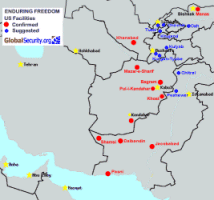Tajikistan Facilities
The United States remains committed to helping Tajikistan in any way it can develop their economy, recover from their war, and rebuild its infrastructure so that the Tajik people may prosper in a stable, productive, democratic, and tolerant society.
Despite reports in late 2001 claiming that US forces were operating out of facilities in Tajikistan, there was initially little to indicate that US forces were actually in Tajikistan. In every government document describing Coalition efforts and contributions to the war on terrorism, Tajikistan was not described as a state that has served as a site for US troops. There was evidence to support the operations of Russian forces but not American.
Tajikistan offered a dilapidated military airfield located near the capitol Dushanbe, which was estimated to cost NATO some $50 million to restore completely. The leader of a congressional delegation that visited Dushanbe in early January 2002 said, however, that Tajik airfields would not have a long-term U.S. military presence, but that the Pentagon would be moving its forces from place to place as needed.
The Government of Tajikistan was a supporter of Operation Enduring Freedom. Its primary contribution has been the use of its international airport in Dushanbe for coalition refueling and basing. By June 2002 the U.S. Air Force had refueled over 400 C-17 sorties in Dushanbe, with British and French air forces also refueling and basing at the airport.
Three years since 9/11 and the October 2001 war in Afghanistan, the American military presence in Central Asia continued unabated. The US military consolidated forward basing in Kyrgyzstan and Uzbekistan, and maintained contingency access to the Almaty and Dushanbe airports.
As of 2006, no U.S. troops were stationed in Tajikistan, though the country permits NATO refueling and aerial transit above its territory to support operations in Afghanistan. The only foreign ground troops in the country are 7,800 Russians. This is down from the 19,800 Russian soldiers present in 2004. Both countries have agreed to gradually shift the burdens of border patrol and national defense from Russia to Tajikistan.
In FY 2005, the U.S. government provided $16.5 million in aid to Tajikistan, including $5.6 million for pro-democracy programs, $10.6 million for economic and social reforms, $26.2 million for security and law enforcement (increased over the previous year to help Tajik security forces cope with the departure of Russian border guards), $16.7 million for humanitarian purposes, $800,000 for other initiatives.
U.S. government assistance to Tajikistan has focused heavily on supporting political reconciliation and the establishment of a stable, pluralistic government. This has included direct support for the now-completed peace process, for demobilizing combatants, and for political party development and election administration. The U.S. government also has promoted the development of a more active civil society in Tajikistan in order to build the groundwork for democratic government. To facilitate Tajikistan's transition to a market economy, the U.S. has helped Tajikistan to rewrite laws and recast the public institutions needed to foster economic growth in a free market. To spur economic growth, the U.S. has promoted privatization, commercial law reform, microcredit programs, agricultural-sector development, and the strengthening of local nongovernmental organizations (NGOs).
The U.S. government's regional environmental and energy programs have supported Tajikistan's participation in Central Asian water and energy management programs. U.S.-funded assistance in the health care sector has demonstrated the openness of the Tajik medical community to quality improvements and the willingness of the Ministry of Health to support needed health-sector reforms.
The United States recognized Tajikistan on December 25, 1991, the day the U.S.S.R. dissolved, and opened a temporary embassy in a hotel the capital, Dushanbe, in March 1992. After the bombings of U.S. embassies in Africa in 1998, Dushanbe American embassy personnel were temporarily relocated to Almaty, Kazakhstan due to heightened embassy security standards. American Embassy Dushanbe personnel continue to work in Tajikistan on an unscheduled and intermittent basis. The embassy can be reached 24 hours a day, by calling either the Dushanbe or Almaty offices.
In February 2009, president Rahmonov announced that he would allow nonmilitary supplies bound to support the NATO effort in Afghanistan to transit through his country. Alternate supply routes were needed in light of neighboring Kyrgyzstan's announcement that it would shut down a major U.S. support facility--Manas air base.
|
NEWSLETTER
|
| Join the GlobalSecurity.org mailing list |
|
|
|


